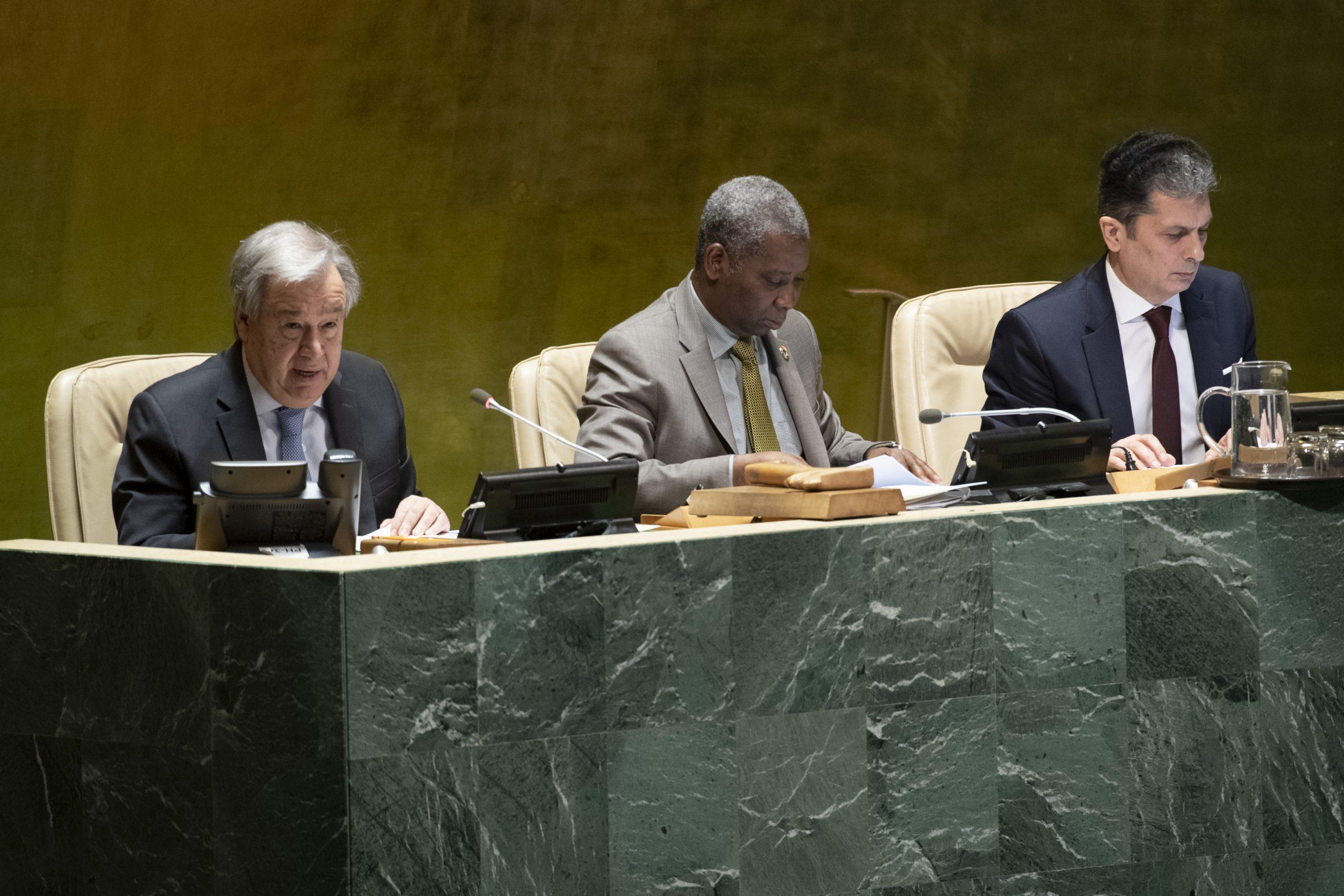- عربي
- 中文
- English
- Français
- Русский
- Español
International Community Reaffirms Commitments to World’s Landlocked Developing Countries
lldcs_mtr_un-photo.jpg

NEW YORK, 5 December 2019 – The United Nations General Assembly today adopted a political declaration reaffirming commitments by the international community to address the special development needs of the world’s thirty-two Landlocked Developing Countries (LLDCs).
At a two-day meeting which started today at United Nations headquarters in New York, leaders and government representatives from LLDCs and their development partners gathered for the Midterm Review of the Vienna Programme of Action which was adopted at the second United Nations Conference on LLDCs held in 2014.
The Midterm Review meeting is being chaired by the President of the General Assembly, H.E. Tijjani Muhammad-Bande and will review progress, identify gaps and propose innovative solutions to accelerate implementation of the Vienna Programme of Action over the next five years. Speaking at the opening of the Midterm Review, H.E. Muhammad-Bande said “Landlocked developing countries are at risk of being left behind. Their economic growth has declined in the last five years and one- third of their population lives in extreme poverty… As we move forward, we need to ensure that all efforts are made to support the sustainable development of landlocked developing countries… Our actions must be guided by the spirit of cooperation and solidarity.”
Over the next two days, discussions will also focus on scaling-up partnerships, strengthening regional integration and building resilient economies and societies in order to turn the LLDCs into vibrant, prosperous and sustainable land-linked countries.
The 2019 report of the Secretary-General on LLDCs notes that countries have exhibited mixed progress in their socio-economic development and that the annual growth rate of real GDP per capita in LLDCs decreased from 3.1 per cent in 2014 to 2.1 per cent in 2017. Despite this, important gains have been made in reducing the numbers of populations living in poverty, improvements in child and maternal health and increases in the number of seats held by women in Parliament. Encouragingly, there have been recent developments by LLDCs and their transit neighbours in deepening regional integration through agreements on transport and economic corridors. Efforts are also being made on diversification and upgrading of their economies, export promotion and private sector development.
Speaking to the media, High Representative for the Least Developed Countries, Landlocked Developing Countries and Small Island Developing States, Fekitamoeloa Katoa ‘Utoikamanu, said “It is clear that while this group of countries is making progress, we need to continue building on that momentum. Over the next five short years, we hope to look back on the Vienna Programme of Action and say that the programme of action achieved concrete results, that it galvanized partnerships and that it brought the world together to work with Landlocked Developing Countries to overcome their unique challenges.”
The political declaration welcomed progress made by LLDCs since the adoption of the Vienna Programme of Action. Together with their transit partners, LLDCs have made important gains in upgrading railways, roads, ports, air transport and inland waterways. Major advances have also been seen in the expansion of modern and renewable energy services. However, of concern, more than 40 per cent of the population of LLDCs still do not have access to electricity and the rural-urban gap remains significant.
Despite notable gains, the political declaration stresses that LLDCs continue to face multiple challenges.
The competitiveness of LLDCs remains limited due to high trade costs which are double that of transit developing countries. Transport and connectivity challenges are also prevalent with only one third of roads in LLDCs being paved. Of particular concern is the decline in the share of LLDCs in global trade. Furthermore, most exports from LLDCs remain highly concentrated in a few primary commodities with limited capacity to produce high-value products. While Official Development Assistance to LLDCs is on the rise, foreign direct investment has continued to decline.
The climate crisis is also having major impacts on LLDCs with many heavily affected by desertification, biodiversity loss, drought and receding glaciers.
The political declaration concludes with a call for action on targeted and accelerated measures by LLDCs and development partners to fully achieve the Vienna Programme of Action in the remaining five years. Actions include: achieving gender equality and the empowerment of women and girls, promoting measures to improve trade and transit transport, building climate and disaster-resilient transport infrastructure, diversifying export structures and value-added exports, building enabling environments for private sector development as well as strengthening foreign direct investment and domestic capital markets.
Speaking at the opening of the Midterm Review, United Nations Secretary-General António Guterres said “The Declaration you will adopt today calls on us to help turn landlocked developing countries into land-linked places of prosperity and opportunity.” He added “Let us join forces to help the world’s 32 landlocked developing countries achieve sustainable transformations and better standard of living for the more than 500 million people who call these countries home. The United Nations system, reformed and repositioned, remains strongly committed to supporting your efforts.”





